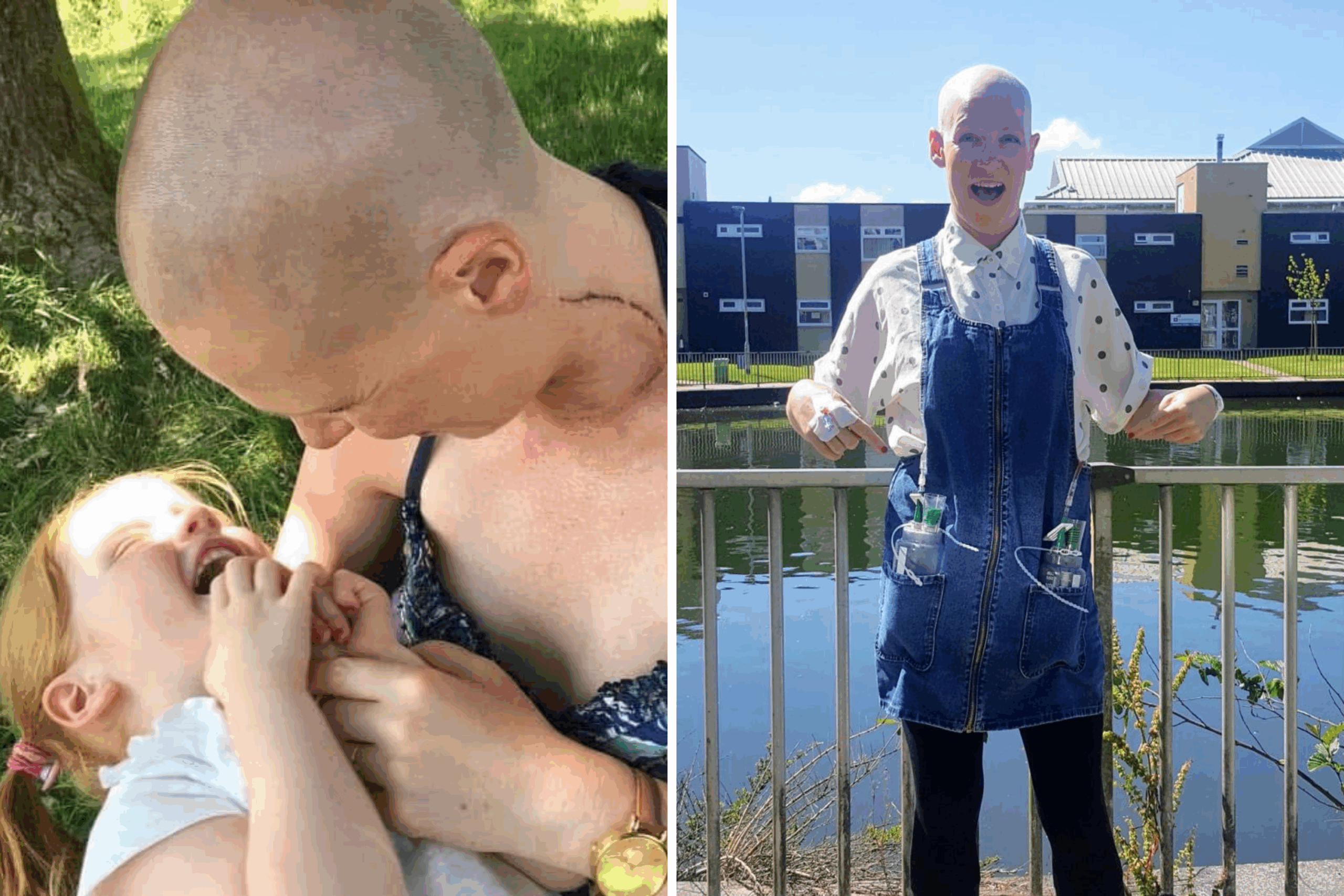Health
Woman Defies Terminal Diagnosis, Celebrates Seven Cancer-Free Years

In 2018, Roisín Pelan received the devastating news that her breast cancer had returned aggressively, with doctors estimating she had just three years to live. Defying expectations, the 43-year-old from Lancashire, England, continues to bring home clear medical scans seven years later. Pelan’s journey embodies resilience and hope, showcasing the complexities of cancer treatment and survival.
Pelan first discovered a lump in her breast during pregnancy, leading to an early delivery and a mastectomy just six days after giving birth to her daughter, Lily, who is now 11 years old. After enduring six rounds of chemotherapy, she was declared cancer-free. However, in January 2018, Pelan began experiencing pain in her chest and a lump in her neck, prompting another visit to the doctor.
“I knew it was back,” Pelan shared. Her diagnosis of stage 3C metastatic breast cancer was a grim reminder of the disease’s unpredictability. The cancer had spread to several lymph nodes, including those beneath her arm and above her collarbone. This stage is often classified as incurable because it indicates that the cancer has begun to spread beyond its original site.
Despite the bleak prognosis, Pelan refused to surrender to despair. “I didn’t have any hope in my heart,” she reflected, noting her initial feelings of hopelessness. But her determination led her to pursue aggressive treatment options beyond what was initially recommended.
Challenging Prognoses and Embracing New Treatments
Pelan’s medical team initially suggested palliative chemotherapy, but she advocated for surgery to remove the tumor and sought out new treatment possibilities. “My oncologist got me on every medication possible, and I went every week for 24 weeks for 18 rounds of chemotherapy,” she explained.
In September 2018, a positron emission tomography (PET) scan confirmed that Pelan was cancer-free again. This clear result has persisted, marking a significant turning point in her battle against cancer. The following year, she and her husband, Michael, adopted a baby boy named Bill, now six years old. Pelan noted that pregnancy can temporarily increase breast cancer risk but may lower a woman’s lifetime risk overall.
Pelan’s experience is underscored by sobering statistics. According to Macmillan Cancer Support, approximately 55,000 women receive a breast cancer diagnosis in the U.K. each year. In the United States, breast cancer is the most prevalent cancer among women, accounting for about 30 percent of new female cancer cases annually, as reported by the American Cancer Society.
Shifting Perspectives on Survival
Dr. Daniel Landau, a board-certified expert in medical oncology, emphasized the importance of understanding survival rates. While these statistics are based on clinical trial data, they often reflect averages that may not apply to individual cases. “No one is average,” Landau noted, highlighting that outcomes can vary widely based on a patient’s unique health circumstances and advancements in treatments.
Landau explained that survival statistics can sometimes underrepresent the potential for positive outcomes due to advancements in therapies, particularly immunotherapy. “Ten years ago, immunotherapies were just a dream,” he said. As new treatments become available, they may significantly extend a patient’s life beyond what earlier studies indicated.
Pelan’s journey has not only been one of personal survival but also of advocacy. She founded Fighting to be Heard, a charity aimed at raising awareness and providing support for those living with incurable secondary breast cancer. She has also ventured into writing, publishing a children’s book and sharing her story widely, including on social media.
Reflecting on her ongoing treatment, Pelan stated, “Even though I had surgery and the tumor was removed, and nothing showed up on scans afterwards, I’m still on long-term treatment.” She takes Palbociclib, a chemotherapy tablet, alongside hormone therapy to prevent the potential growth of microscopic cancer cells.
Pelan’s emotional journey is punctuated by milestones such as watching Lily start and finish primary school. In an Instagram post, she captured her feelings, stating, “It’s impossible not to think back to those early days when I didn’t know if I’d get here. It’s been emotional.”
Through her story, Pelan exemplifies the unpredictability of cancer, the importance of advocating for one’s health, and the potential for hope even in the face of grim prognoses.
-

 Lifestyle3 months ago
Lifestyle3 months agoLibraries Challenge Rising E-Book Costs Amid Growing Demand
-

 Sports3 months ago
Sports3 months agoTyreek Hill Responds to Tua Tagovailoa’s Comments on Team Dynamics
-

 Sports3 months ago
Sports3 months agoLiverpool Secures Agreement to Sign Young Striker Will Wright
-

 Lifestyle3 months ago
Lifestyle3 months agoSave Your Split Tomatoes: Expert Tips for Gardeners
-

 Lifestyle3 months ago
Lifestyle3 months agoPrincess Beatrice’s Daughter Athena Joins Siblings at London Parade
-

 World3 months ago
World3 months agoWinter Storms Lash New South Wales with Snow, Flood Risks
-

 Science3 months ago
Science3 months agoTrump Administration Moves to Repeal Key Climate Regulation
-

 Science2 months ago
Science2 months agoSan Francisco Hosts Unique Contest to Identify “Performative Males”
-

 Business3 months ago
Business3 months agoSoFi Technologies Shares Slip 2% Following Insider Stock Sale
-

 Science3 months ago
Science3 months agoNew Tool Reveals Link Between Horse Coat Condition and Parasites
-

 Sports3 months ago
Sports3 months agoElon Musk Sculpture Travels From Utah to Yosemite National Park
-

 Science3 months ago
Science3 months agoNew Study Confirms Humans Transported Stonehenge Bluestones









